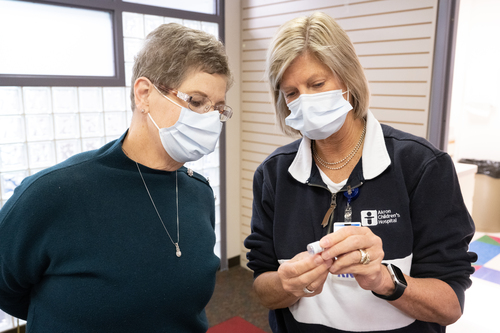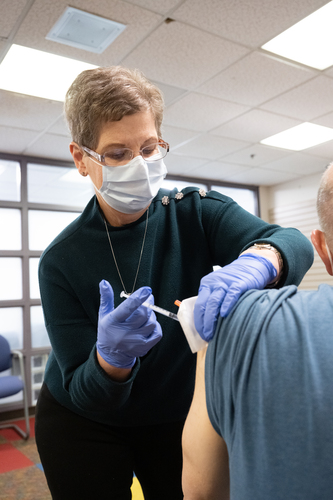
Nurses Nancy Shipe and Kathleen Hose offer immunizations in Employee Health.
After nearly 36 years of working as a nurse in Akron Children’s Neonatal Intensive Care Unit (NICU), Lisa Palmer, RN, retired in April 2021, eager to spend more time with her family, particularly her 2 young granddaughters.
But a few months later in October 2021, the hospital sent out a request to recent retirees asking for assistance with its COVID-19 vaccination effort, and Lisa returned to her scrubs to answer the call.
“The pandemic took such an emotional toll on everyone,” she said. “Knowing that the vaccines were vital, [returning to work] was a no-brainer. I just felt like that was the most important thing I could do to help prevent needless death and suffering.”
Lisa returned to work at Akron Children’s in a PRN capacity, meaning on-call as needed, where she worked 1 to 2 days per week administering the COVID-19 vaccine to both patients and hospital employees.
As COVID cases surged and the pandemic exacerbated organization-wide staffing shortages, Akron Children’s implemented a voluntary paid program called Helping Hands in fall 2021. The program provided opportunities for employees to work in understaffed areas, outside of their regular working hours. More than 800 hospital employees signed up for the program, and 11 recently retired nurses returned to the hospital.
At a time when health care systems nationwide needed nurses, Lisa said she couldn’t imagine returning to work anywhere but Children’s.
“Akron Children’s is a part of me,” she said. “It’s a part of my entire adult life. I would never want to be anywhere else. If I couldn’t have been at Akron Children’s, I probably wouldn’t have been a nurse. It’s unique. The level of care and the level of compassion is different.”

Retired NICU Nurse Nancy Shipe returned to work through the Helping Hands program.
Supporting former co-workers
For some retirees, the decision to return to work went beyond the vaccination effort. After 35 years working in the NICU, Nancy Shipe, RN, retired in June 2021. She returned to work through the Helping Hands program, motivated by a desire to help her former co-workers in the NICU.
“I just wanted to help them out so badly. My heart was breaking for them,” said Nancy Shipe. “It’s the nurse in you and the desire to help others. [The NICU] was part of my family.”
Now, she works one 8-hour shift per week. When she’s not providing immunizations in Employee Health, she helps in the NICU.
“I was able to go into the NICU and help them with feeding and stocking, doing whatever needed to be done,” she said. “They seemed very thankful that I was there.
“Nurses, in their core being, that’s who they are. You can go to a different facility, but if you’re fulfilled in your career, it’s because that’s what fulfills it – helping someone.”
Easing the transition to retirement
For some nurses, the ability to work PRN has offered greater flexibility, while easing their transition into retirement.
Nancy Mosca, PhD, RN, retired from her role as director of nursing professional practice in July 2021, and transferred to the PRN role of nursing professional practice consultant. A few months later as COVID cases climbed, she began answering the hospital’s COVID call line to screen and triage symptomatic employees.
“It was a nice opportunity for me, because I was having a hard time leaving,” she said. “I knew it was time for me to retire, but it was difficult because I like my work so much. Coming back has been special because it’s kept me connected to the organization. I answer the phones, and I get to talk to a lot of folks I once knew in my former role – people who are surprised to hear me on the other end in this role.”
Christine Sadie, RN, BSN, shared a similar experience. After 46 years with the hospital, she retired in January 2019 from her role as nurse manager, only to return 4 months later in a PRN position to assist with third-party audits.
“I was excited to come back,” she said. “I wanted to be around people. As a nurse manager, you dedicate a lot of time and hours to your unit. But I wanted to make those connections and fulfill those relationships that you need to have with others.”
This year, through the Helping Hands program, she worked the COVID call line with Nancy Mosca, helping to answer hundreds of calls and voicemails.
“It was really gratifying to be able to help,” said Christine. “Some of [the callers] didn’t know what to do. They were trying to figure out what they needed to do next to protect themselves, their families and the patients they’re taking care of.”
Staying connected to the hospital and patients
Through her work at the vaccine clinics, Lisa said she reconnected with a few of her former NICU patients and their families. “It warmed my heart,” she said. “That was the highlight of my day. It’s incredible to see what little people they’ve become.”
It’s moments like these and the caring nature of the nursing team that keeps retirees connected to the hospital. Lisa says she’s not surprised to see the number of nurses who are leaving retirement to return to Children’s.
“I wouldn’t expect anything less from our nursing staff,” she said. “It’s hard to explain, but Akron Children’s is just a different place to be.”










